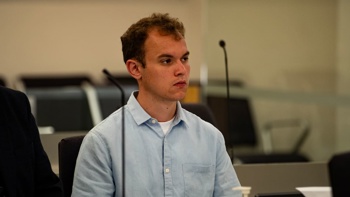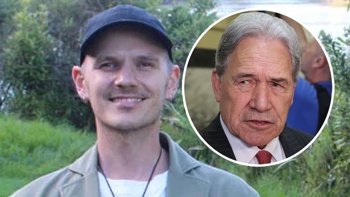Nearly two months after polling day, Chris Hipkins and Christopher Luxon are finally back in the Parliamentary ring as the 54th Parliament got under way with the Address in Reply debate, the first debate of the term, when MPs bash skulls about over the new Government’s agenda.
Opposition leader Chris Hipkins got proceedings under way delivering the first speech in which he described the new Government as “pathetic” and a “disgrace”.
He said he could not find even a “shred of vision” in the new Government’s agenda, which leaned heavily on plans to “repeal, replace, reverse, and disestablish” the former Government’s agenda.
“A plan to go backwards not a plan to take New Zealand forward,” Hipkins said.
He said the new Government was beholden to NZ First leader Winston Peters, describing the spectacle of seeing Luxon race to Auckland to negotiate with Peters, rather than make Peters come to Wellington as “pathetic”.
He said that Labour accepted New Zealanders had “voted for change” but that he did not think the new Government was the change they had voted for.
He said that National’s decision to roll back Labour’s smokefree policy was a “disgrace” and a “stain on New Zealand’s international reputation”.
Speaking after Hipkins, Luxon shot back, saying Labour had “squandered” its historic 2020 majority.
“They started the last term with everything they needed to set up a political dynasty for the next decade but they squandered it,” Luxon said, describing Hipkins as “bitter, and twisted, and negative”.
Luxon hinted that Hipkins might not survive as leader, a classic Government tactic to sow seeds of doubt and instability in the opposition.
“Why is he still here when so little was achieved?” Luxon said.
He that New Zealand had voted for a Government that could “get things done”.
He said the new Government would “get public services working better”.
Luxon attacked Labour’s record on health saying that the former Government “looked anguished” about the state of public services, but could not convert those looks into action.
“Looking anguished doesn’t actually reduce a wait list,” Luxon said.
Earlier:
Labour is continuing its pressure on the new Government, accusing it of “continuing Māori attacks” in response to the Governor-General’s Speech from the Throne today laying out the agenda over the next three years.
The commitment was read by the Governor-General Dame Cindy Kiro and written by the incoming Government, setting out its priorities for the next term.
Despite being read by Kiro, the speech sets out the agenda of the National, Act, and NZ First coalition. The commitments in the speech are also found in the coalition agreements between the three parties.
Kiro said the Government would achieve its spending promises by “restoring discipline to government spending”.
It included pledges to disestablish the Māori Health Authority and assurances there would be ‘no co-governance of public services’.“
“Services will be delivered on need, using a range of effective providers, including iwi and community groups who have the best reach into the communities they serve,” she said.
Kiro also outlined an array of Labour initiatives that would be repealed, from RMA reforms to Fair Pay Agreements, alongside a more punitive approach to justice such as restoring the “three strikes” legislation.
Labour leader Chris Hipkins said afterwards there was a “lot in the speech that I disagree with”.
“Ultimately, though, it’s the new Government’s agenda and helps us to set out our response.
“I think there were a number of examples in there of sort of bold decisions being made by the incoming Government that actually probably won’t stick up to scrutiny.”
Hipkins was asked about a moment when was seen laughing visibly when Kiro mentioned “strong and stable government”.
“They were talking about strong and stable all the way through the coalition negotiations, which are [now] proving to be anything but,” Hipkins said.
On reports the Government was looking to scrap incentives for public sector workers to speak te reo Māori, alongside other work to decrease its use in favour of English, Hipkins said its previous increasing use was a “source of pride for New Zealanders”.
“When we watch the All Blacks doing the haka overseas, we all feel proud about that. We should actually celebrate the Māori language and culture as New Zealanders. It’s one of the things that makes us different from the rest of the world. It is a treasure for all of New Zealand.”
Hipkins said he thought staff should be incentivised to speak and use te reo at work.
“Te reo Māori is an official language of New Zealand. So we asked government departments to have the capability to be able to work in te reo Māori and to be able to interact with members of the public in te reo Māori. And in order to do that, they have to have a workforce that’s capable of doing that.”
/cloudfront-ap-southeast-2.images.arcpublishing.com/nzme/RUTZPZ34Q5ECRBO3MJXUX6EOWQ.jpg)
Te Pāti Māori co-leader Rawiri Waititi at the swearing in of Parliament. Photo / Mark Mitchell
Initiatives to increase te reo in the public sector can be linked to an Act in 2016, which was brought in under a National-led government.
On Waitangi next year, Hipkins said it was “always a place of robust debate” but he had always tried to “strike a unifying tone”.
“That will certainly be my intention next year as well. How the new Government is received will really depend on the decisions they make between now and then.”
Labour’s Māori development spokesman Willie Jackson said the speech was a “tough listen” given Kiro’s background, but they accepted the tikanga/protocol.
“You can’t say a word can you, but incredibly disappointed ... to her talking about the spending, the Māori Health Authority. You hear about the Treaty principles. So again, just the attack in terms of Māori continues.”
Meanwhile, NZ First Cabinet Minister Shane Jones explained why he had written to new Speaker of the House Gerry Brownlee over the conduct of Te Pāti Māori during the Parliamentary swearing-in on Tuesday, when three MPs referred to King Charles III as “Kīngi Harehare” instead of the formal Māori translation of “Kīngi Tīare”.
Co-leader Rawiri Waititi explained Harehare was a common term for Charles - he said he had an uncle with the name - although in some places it can also mean scab, skin rash, and/or something sinister.
“I’m sure that the Clerk of the House was confident that the intent was there but it is arguable whether the term was taking the P, I double S or whether it was a genuine thing,” said Jones.
“If we’re going to see three years of this kind of theatrical behaviour, I certainly don’t want to see any more edible art or wearable art in Parliament.
“What I want the speaker to do is lay down very firmly what his expectations are the decorum of the house the conduct in the house. And if we’re expected all to abide by the letter of the law, then it applies to Winston and I and everyone else.”
Take your Radio, Podcasts and Music with you









